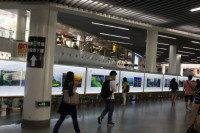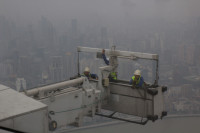The environmental priorities of China’s citizens
I spent almost a month travelling in China earlier in the summer. It was my first visit for over 35 years. In answer to the question ‘Have you been to China before?’ saying ‘Yes, when Chairman Mao was alive’ was a bit of a conversation stopper. My intention was to learn what the environment and sustainability issues are for Chinese people and how they are being addressed, if they are. Inevitably the answers are both positive and negative and my impressions are coloured by the places I went to and the people I met, so constitute a snapshot rather than a complete picture. I did have one very big advantage, I travelled solo and had no engagement with official bodies of any kind.
Sustainable development as we understand it in the UK, is not really on the agenda of ordinary Chinese citizens. Their concerns are more basic, but just as relevant. It is striking that there is almost no sign of any kind of harnessing of renewable energy at a local level e.g. through solar PV or solar hot water on flats or houses in cities like Beijng and Shanghai, despite a benign climate. I was told that this is down to how local government prioritises and that the rush for economic growth is generally seen as more important at the local level. Urban agriculture/rooftop gardening in cities, which has become all the rage in parts of the West including the USA, Europe and parts of Latin America is equally unheard of. There a few very small experiments in Shanghai – by expats. Public transport and cycle use on the other hand, despite the rapid rise of car ownership, are high and public transport is of a high standard. Navigating myself around Beijing on the metro using the latest edition of the ‘Rough Guide’ I realised that I was travelling on lines that weren’t even marked as ‘under construction’ on their maps , let alone operating.

In 2007 China overtook the USA as the world’s largest carbon emitter and in 2012-13 overtook the USA as the world’s largest importer of oil. It accounts for half the world’s annual coal consumption. Yet pressure on the Government to address carbon emissions is not coming from ordinary Chinese citizens, because their environmental conversations are elsewhere. However, and this is the good news, environmental conversations are widespread and while there is currently some disconnect between their expressed concerns and wider sustainable development agendas, there is little doubt that these concerns are leading to a much broader awareness of the implications of doing nothing. The three key environmental issues for Chinese people are air quality, water quality and food safety.
We are familiar with pictures of pedestrians and cyclists in Beijing in spring wandering around in thick smog, wearing face masks. Air quality in cities is appalling, almost all the time. It is worse than the Government admits and there is a refusal to publish meaningful data on a regular basis, so local NGO’s and some Embassies publish data from their own monitoring stations. The levels of PM2.5’s in the atmosphere is generally considered to be too high in Europe if they reach 40ppm and hazardous to health in excess of 120 ppm. Levels in Beijing or Shanghai regularly exceed 350 ppm, a level which most locals don’t consider particularly problematic. They start to get worried at 500 ppm. In December 2013 Shanghai experienced levels over 600ppm for days, as did neighbouring provinces and cities across the country including Beijing, Guangzhou and Xian – with over 600m people affected.

People are asked to stay indoors at these levels and enterprising firms now sell ‘72 hour survival kits’ for such eventualities. Contents range from a basic food, water and other necessities to games and other entertainments for children. The economic impacts are beginning to be felt as foreign businesses are increasingly unwilling to expose their staff and their children to these levels of pollution on a regular basis. Several families I met who had the means and contacts to leave, were leaving Shanghai this year as a direct result of concerns about air quality and its impact on their children’s health.
Water quality at first sight looks good, but almost nobody who can afford to, drinks it. This is because it is believed to be full of heavy metals which, while they won’t kill anybody in the short term, have significant health effects over a prolonged period. Bottled water is one of life’s necessities in cities. In rural areas over 300m people still do not have access to clean drinking water with agricultural pollution a major cause of the problem.
Food safety is the other concern on everybody’s lips. The local media regularly report adulteration scandals and groups of people falling sick or dying in provincial towns as a result of eating something that wasn’t what the vendor it claimed it to be. Cadmuim in rice has been one widespread concern. People are very untrusting of what they eat and there is a tendency for this to encourage the consumption of more fast food from foreign owned outlets such as KFC, McDonalds or various pizza chains. Imported foodstuffs are popular with those that can afford them.
Deng Xiao Ping’s 1980 maxim that ‘Development is the absolute priority’, has completely transformed China and its people are educated and literate. The government is aware that as well as seeking the rapidly rising standard of living encapsulated in Deng’s statement with the proverbial ‘two power stations a week’ opening, its citizens also experience a downside and that this leads to social unrest. In March 2014 Premier Li Keqiang declared that China would ‘declare war’ on pollution, reform the energy market , encourage non-fossil fuel power and cut capacity in the steel and cement sectors. It seems that the ‘airpocalypse’ in Shanghai, Beijing and other cities late last year was a turning point, as it sparked a widespread social media protest. China is a police state and that kind of protest strikes fear into the Government.
It is the contradiction at the heart of the Chinese economic model. Keeping the population sweet by increasing standards of living and creating an economy that is forecast to overtake that of the USA in size this year of next, requires absolutely huge investment. Last year China installed more solar power – 12 GW, than the USA has in total and anticipated installing a further 14 GW this year. But this is a tiny element of a sector of extraordinary scale. Fossil fuels were reported to have added nearly 140,000 terawatt hours in new electricity capacity in 2013, wind a further 20,000 and that solar investment , around 4,000 terawatt hours. China’s coal use still accounts for over 65 % of its total energy consumption. The Chinese economic model is, as we all know from our everyday shopping habits, very heavily export orientated. Chinese citizens are becoming a lot more aware that their environmental conditions are deteriorating before their eyes. Perhaps we share some of the responsibility for this by our continuing to buy cheap stuff – stuff produced cheaply precisely because there are few environmental regulations in the factories in which it is made and even fewer that are enforced.
A slightly shortened version of this article first appeared in the September 2014 issue of Town & Country Planning


richard oram
October 11, 2014
I recall when the Chinese tossed our empty beer bottles off the train just after we passed over their border into Mongolia. Seemed to be a political statement. Perhaps there is a lot of glass to be reclaimed; let’s go search.